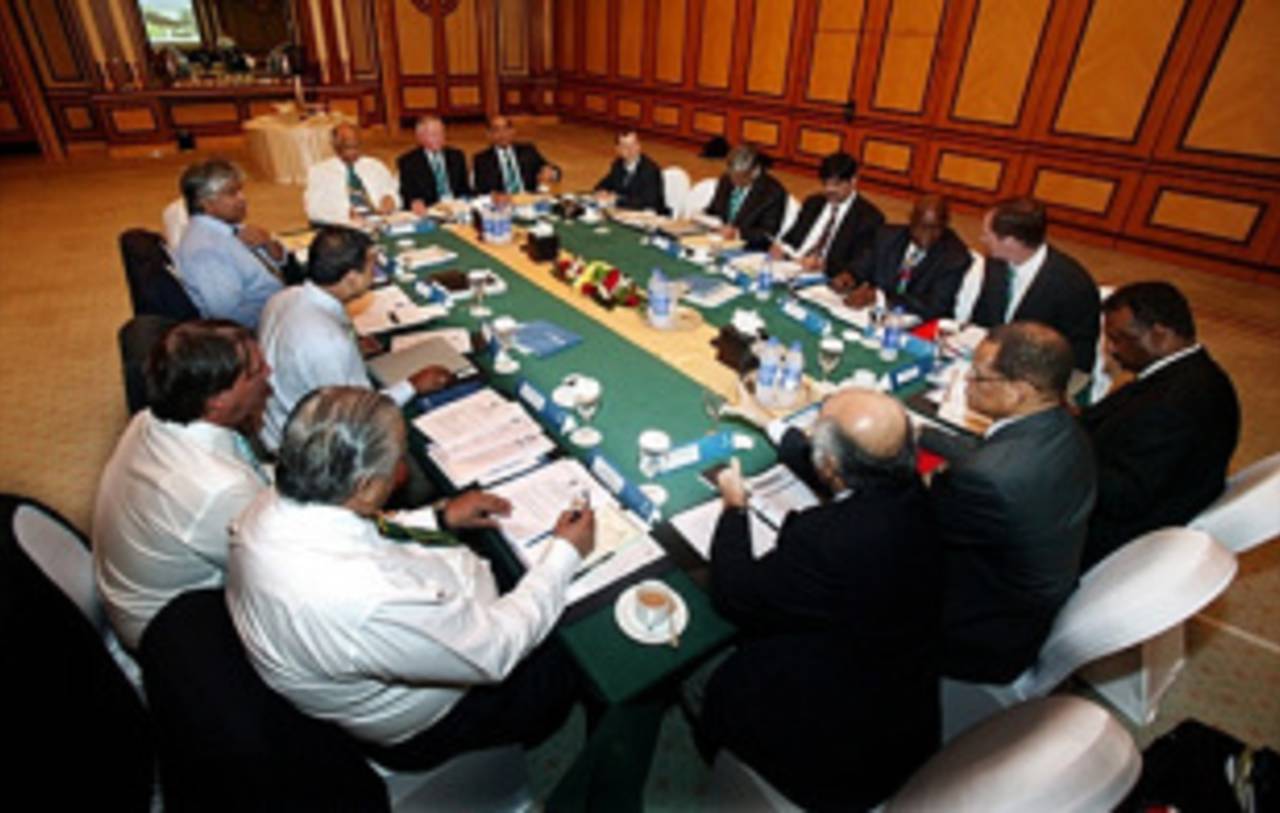Have power, will manipulate
That's how the world and its leaders work. But it would be nice if India took the lead in governing the game well
Harsha Bhogle
02-Jul-2010

The ICC is a very political organisation, but so is every single sporting body from the IOC to FIFA • International Cricket Council
So cricket sits on the precipice again? Rabble rousers and respected cricket writers are sharpening their phrases, warning of the impact of a brown-white divide; there is talk of digging in heels and taking warlike positions. After a temporary lull, the peace flags are down. Is it us-and-them all over again? I fear we over-react, get blind to our failings and discover pure venom in differing ideologies and cultures. I suspect we need to be a little more realistic, a little more understanding of the decisive way the world is changing.
Remember, we are a very small sport, no more than 10 countries really, and with inequitable distribution of wealth and opportunity it is not very difficult for power blocs to emerge. The ICC is a very political organisation but so is every single sporting body from the IOC to FIFA. To believe otherwise is naive.
It might seem, therefore, that on the surface Zimbabwe and South Africa led the opposition to John Howard, but that his nomination would not have failed had India supported him. Ah, India again! That is where I believe the resentment lies. It is not surprising, for India is seen in some countries as a nouveau riche brat flexing his muscles at every opportunity.
India has stumbled onto leadership through a combination of demographics and an unshackled middle class. A country long seen to be tame and accepting is now being looked upon as devious and manipulative. That should surprise no one because leaders around the world use their power to manipulate and to subjugate. It is not a worthy trait to possess, but India is neither the first nor will it be the last.
When they controlled the ICC, England were both condescending and manipulative. Having lost two series to India in 1971, at home, and in 1972-73 away, they forced through temporary legislation restricting the number of fielders on the leg side to five, thus negating India's spinners. They regularly looked down at our part of the world, and I have personally been at the receiving end of three instances of offensive and insulting behaviour at Lord's. This is not to say the English are terrible and villainous, perish the thought, just that power makes certain people behave a certain way.
The closest similarity to the financial power India currently enjoys in cricket is that which the United States had over world politics after the Second World War. The US openly took sides, openly protected its allies, created discord among those who dared stand up, funded rebellion, and through such manipulation maintained its leadership position. Like with India, it was the financial muscle of their markets that was at the heart of it. We in India know that well through 1971 and the crippling financial sanctions that were imposed because we thought we were mature enough to possess nuclear power.
Conflict of interest and lack of transparency, though they are global features as we saw post-Iraq, almost define Indian cricket. While many leaders are manipulative, the truly great are statesmanlike and India have that opportunity; one they are currently squandering
The East India Company was manipulative, so were the Mughals who inflicted rather more gruesome ends on those who opposed them, and indeed so were the Rajputs and the other Indian princely states. Indian politicians are deeply manipulative, as were George Bush and Dick Cheney and Richard Nixon and Henry Kissinger, and I would venture to say it is almost an inevitable outcome of possessing power. And so India's cricket officials are currently flexing their muscles, and should the cycle change again, as it delightfully does, Australia will flex their muscles too. Don't think otherwise. Power tends to create tyrants out of perfectly reasonable people. Mandela and Gandhi were exceptions.
And yet, I would love it if India was different, if it could indeed take the lead in governance and transparency, focus on making cricket a richer sport rather than dragging it through controversy. In recent times Indian cricket has been in the news for annulling signed contracts, for being in dispute with the income-tax authorities and other legal entities; every time the question of television rights comes up, it is accompanied by many battles in court. Conflict of interest and lack of transparency, though they are global features as we saw post-Iraq, almost define Indian cricket. While many leaders are manipulative, the truly great are statesmanlike and India have that opportunity; one they are currently squandering.
But the message for the erstwhile rulers is that the world is changing. This is not a catcall of joy, merely an economic fact, and I will be disappointed if it is misinterpreted. On Thursday the Group CEO of HSBC said, "… the shift from the West to the East is unstoppable... It starts in India and goes all the way down to Australia..." Cricket, a very tiny part of the world, merely mirrors that.
A group of 10 cannot afford to be at war with each other, cannot take up strident positions. There must be other ways. Acceptance and cooperation can open the doors to those.
Harsha Bhogle is a commentator, television presenter and writer